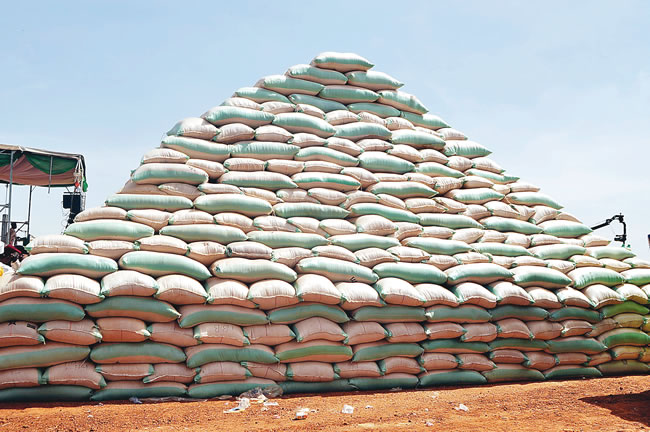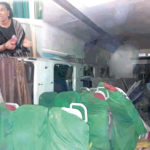Rice is no doubt the most consumed food in Nigeria, however, the commodity which can be described as essential, has become something which many Nigerians cannot afford due to its very high price in the market, despite series of government interventions to make it available to the masses. Nigerian Tribune’s duo of NURUDEEN ALIMI and COLLINS NNABUIFE spoke with stakeholders to seek reasons rice has become unaffordable for average Nigerians.
CLIMATE change, insecurity, high cost of production among other challenges have been attributed to the high price of rice which makes the Nigerian most staple diet unaffordable to most Nigerians.
The Federal Government, through the Central Bank of Nigeria (CBN), launched the Anchor Borrowers’ Programme (ABP) with the intention of making rice and other commodities sufficient. But many Nigerians as of today cannot afford to buy rice because of the high cost.
Speaking with the Nigerian Tribune, President of Rice Millers Association of Nigeria (RIMAN), Peter Dama attributed the lingering insecurity across the country to the impossibility of farmers to access their farms, saying this has left millers without paddy to mill.
He said there are situations where after planting, farmers who were able to access their farms would discover that the bandits have harvested their rice and taken them away.
Dama also noted that climatic conditions such as drought is also affection rice production in some parts of the country.
“You find out that people are being chased out of their farms, or they go to their farms and find out that vandals or bandits have harvested their crops and taken them away. Insecurity is a very big challenge and it is affecting production in terms of cultivation.
“Secondly, the rains are not just there, a lot of the rivers or places people use for planting rice are dried up, that is not within our control, you give somebody a farm, he digs a borehole and there is no water, these are natural things affecting production”, he said.
Furthermore, he said poor power supply and vandalisation of power infrastructure in the factories and high cost of diesel have left miller frustrated.
“For production, power is very essential, because in a factory or production area, you need to have power. In Spite of the difficulties that power distribution companies are having, there are some Nigerians that are so terrible that they go to vandalize power infrastructure.
“Government is trying to provide for you to be able to process and mill rice, at the end of the day, you go to your factory to find out that your armoured cables have been vandalised, that is a problem.
“A lot of millers depend on generators because of the failure in the provision of energy, but these generating sets don’t use water, they use diesel and petrol, but the price of diesel has skyrocketed, and it is a problem.
He said Nigerian miller and rice processors are doing their best in such a way that in spite of the challenges , they still continue production.
“Do not expect millers or processors to be the people that subsidise consumption for this country, it is expected that with the difficulties we are passing through, we should be able to make little profits. The sac bag used to cost maybe N1000, but currently, it has gone up to between N3000 to N5000 per sac bag.
While sharing his thoughts, Chairman, Rice Farmers Association of Nigeria (RIFAN), Oyo State chapter, Pastor Samuel Akindele said: “The bulk of the interventions by government are in form of loans and not grants. At the same time, cash is not involved.
“Another thing is that it is the farmers that scout for land from private sources and that’s another cost. Land clearing is major in our operations and no assistance from anywhere up till this moment.
“The cost of plowing has jumped from N7,000 to N8,000 per acre of land now and farmers do not have any easy access to one now. No access to any working dam to irrigate our farms, as an incentive, from any arm of government now.
“Security against the grazing cows on our farms cannot be guaranteed at night because the farmers cannot sleep on the farms.
“Now, talking about labour, agrochemicals, spare parts for our farm tillers, transplanters, milling machines, Diesel and petrol, fertilisers from about N8,000 to N15,000 and N17,000 now. What of transportation? So all these factors are the ones milititating against rice production in Nigeria, we hope that government will one day do something drastic about the problems.”
A major stakeholder in the agricultural sector of the Nigerian economy, who craved anonymity, said the issue of insecurity and high cost of production are major factors contributing to high cost of rice in the country.
He noted that:”Locally produced rice is not available as been speculated. At the end of the day the output on rice production may not even justify the imputs unless we view it from the angle of government subsidising rice production.
“Currently, imported rice still compete with the little local rice available in the market. If imported rice is removed from the market, local rice would be nothing to reckon with. Goverment should as a matter of urgency adress the issues of in security, intesfy efforts on mechanised farming through large scale production of locally manufactured farm equipment.
“Government must also senstise people most especially the youth to embrace meaningful agricultural production as an occupation, rather than none-sustainable occupation that are not beneficial to the masses.”
Executive Secretary, Agricultural Research Council of Nigeria (ARCN), Professor Garba Sharubutu, while commenting, said that some factors such as climate conditions, low technology, poor quality seed are contributory factors to the high cost of rice in the market.
He said despite being the most consumed food in Nigeria, rice has continued to record low yield in the country, with an average yield of 25 bags per hectare.
Sharubutu said some farmers also get as low as 20 bags per hectare because of climatic conditions like drought, while in some areas, farmers get as high as 50 bags per hectare
“The most staple and most demanding crop we have in this country is rice, so practically, everybody eats rice, and because everybody eats rice, it means that the demand will be very high, so you will find out that it is in high demand, and anything that is in high demand, the price will always go up.
“With the varieties that we have, you will find out that the yield per hectare up till now remains an average of 25 bags per hectare before we were battling with 20 bags per hectare, we have variety that can give us as high as 50 bags per hectare but that does not cut across all farmers.
“Some farmers are battling with 20 bags per hectare, some are battling with 30 bags per hectare, because a major part of our food system depends on rice, and some natural disaster in terms of drought and other forms of production losses has been responsible for this low harvest.
“If there is low harvest, you will know that definitely the supply will be small irrespective of government intervention”, he said.
Professor Sharubutu further stated that land preparation has been a major challenge for rice farmers, which makes it most of the time to borrow monies from off-takers and middlemen to prepare land and get seeds for planting.
Sharubutu said when these farmers harvest, they will use their rice paddy and repay the loan they took, while the remaining rice paddy is mopped up by the off-takers and middlemen, who then now hoard the rice as they await for the price to increase before the release them to the market.
Sharubutu further explained that the reason why farmers take loans from the off-takers is because the period for land preparation falls within the festive periods and educational period and the farmers need money.
“Another thing is that between the time of preparation of land to the time of harvest it takes a farmer virtually about six months, and a good number of the farmers will not be able to sustain the lack of early source of income between the time of land preparation and the time of harvest.
“Most importantly, the time for land preparation and seeding is also the time for seasonal activities in terms of our social life and our educational lives. Land preparation demands money, and at the same time you have to take your children to school, at the same time you have your Easter and Sallah preparation, so most of our farmers need money, and because they need money, they have to meet off-takers or middlemen to collect money in advance for what their harvest is going to give and you don’t sell what you don’t have yet.
“But because of these activities, our farmers especially the smallholder farmers collect these monies till when eventually they will sell their harvest, so when they receive these monies you can imagine the kind of farming they are going to do, the money has already been collected, the farmers get demoralised, so at the end of it, these produce are sold very cheap because they have already collected the money, now the middlemen and off-takers will come and take the rice.
“The cycle of poverty now comes up again because after six months of tilling the soil you will end up with nothing.
“Even if you have farmers that did not collect money from people, after harvesting the rice, storage becomes a problem. Some of these farmers have just a room and parlour, that means there may not be a place to store the rice. Even if they want to store the rice at the community store or a storage that is owned by someone, they have to pay and it will add more to the cost, some farmers pay with their harvest.
“So, storage facilities are a major problem, the government has been trying to establish storage facilities and you will find out that the common man may not have access to those facilities”, he asserted.
WATCH TOP VIDEOS FROM NIGERIAN TRIBUNE TV
- Let’s Talk About SELF-AWARENESS
- Is Your Confidence Mistaken for Pride? Let’s talk about it
- Is Etiquette About Perfection…Or Just Not Being Rude?
- Top Psychologist Reveal 3 Signs You’re Struggling With Imposter Syndrome
- Do You Pick Up Work-Related Calls at Midnight or Never? Let’s Talk About Boundaries






